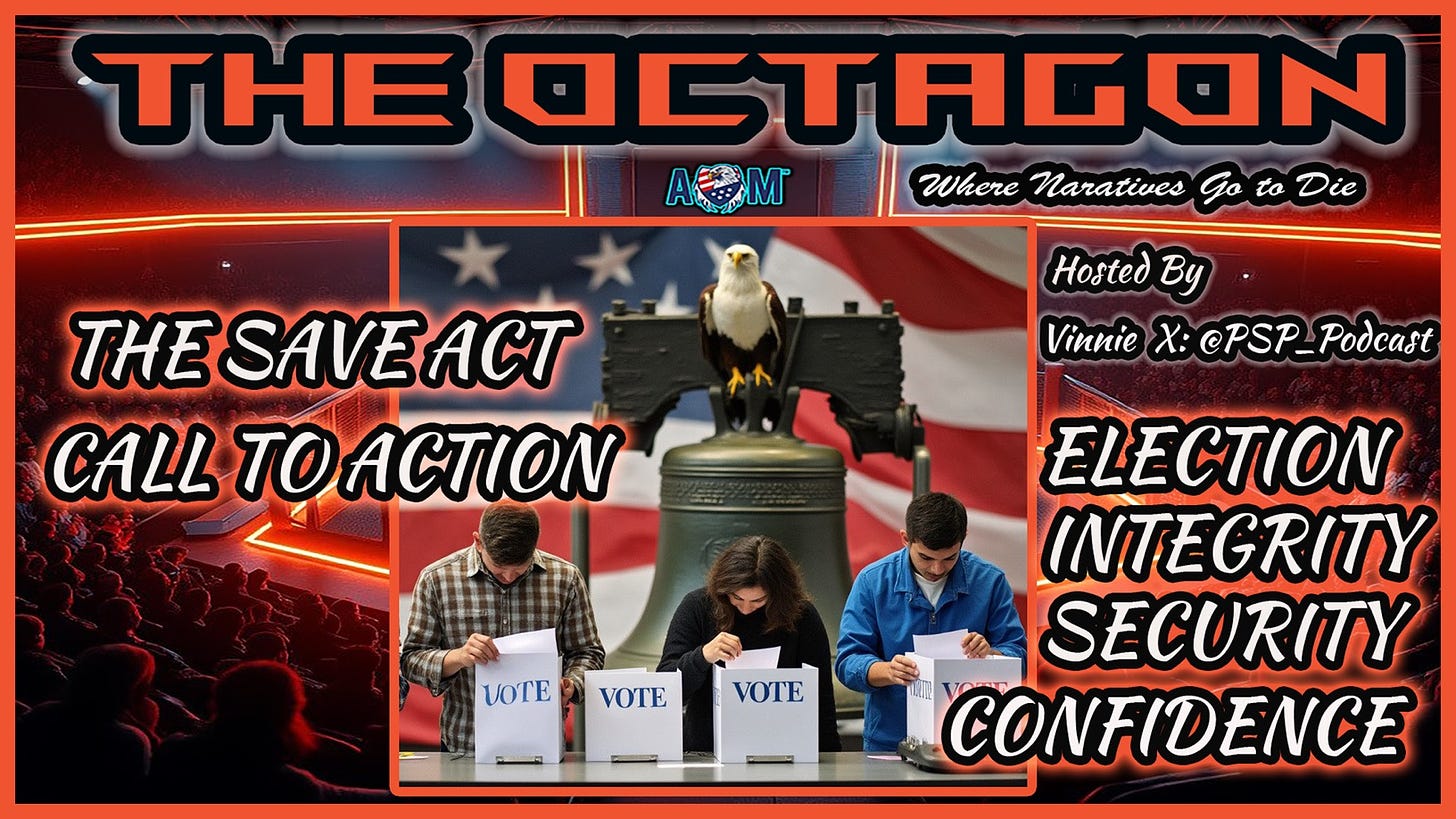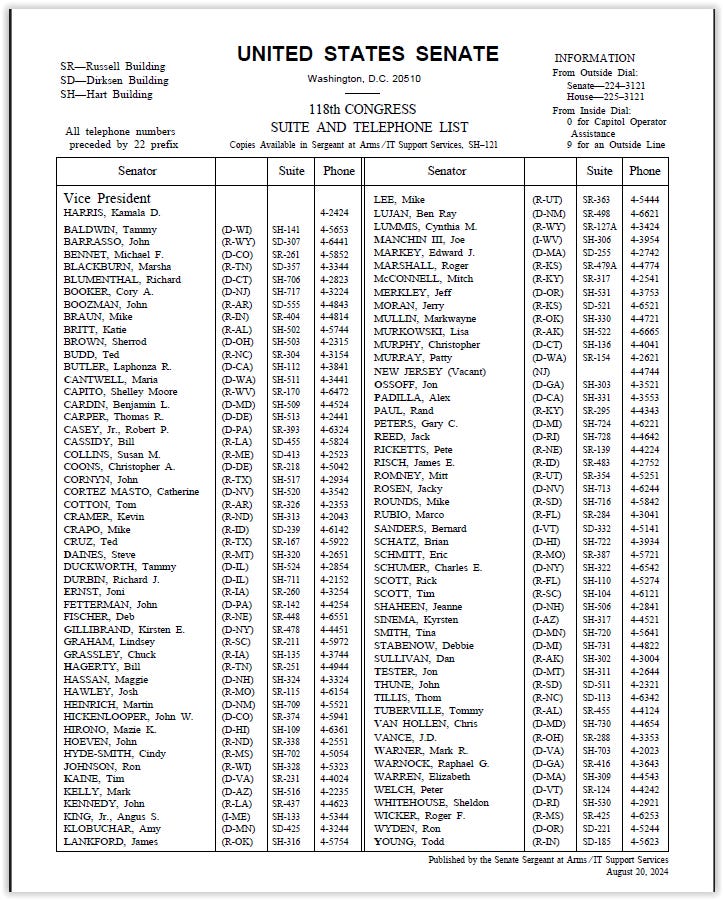📢CTA! The SAVE Act Can Save Democracy

Prevent foreign infiltration in our elections! Amplify your voice!
Join us on The Octagon XSpace Thursday, September 5th
at 7pm edt to learn about the SAVE Act*, and be empowered to help get it passed!
S4292 SAVE ACT To amend the National Voter Registration Act of 1993 to require proof of United States citizenship to register an individual to vote in elections for Federal office, and for other purposes.

Tools to Amplify Your Voice
- Create an X Post & tag your Senator: Senate X List
- Sample X Post: to be created in the XSpace!
”@ [X Handle] please support the #SAVEAct, S. 4292! This legislation is crucial for ensuring that only U.S. citizens participate in our federal elections, which is fundamental to the integrity of our democratic process. This act will help maintain trust in our electoral system.”
- Sample X Post: to be created in the XSpace!
- Call your Senator! Senator Phone Extension list*
- Sample Call Script
“I am calling today in support of S4292 the “SAVE ACT” which was passed by the House of Representatives in July. It is imperative that Senator (xxx) vote in favor of this important legislation! There have been very few opportunities to insure election integrity on The National level, and Senator (xxx) has a chance to make a real difference by voting for this bill. Our Republic in jeopardy. Our electoral infrastructure is in shambles. Without Senator (xxx)’s support we could become Brazil, Cuba, or Venezuela! Thank you for taking my call.”
- Sample Call Script
- Send an ‘email’! Use Fiscal Note to send a message to your Senator!
*Phone extensions

The Democrat Open Borders Plan
📣🚨They just keep coming…see the illegal immigrants at one of the states who approved DL for everyone,
citizen or not, with added bonus of instant voter registration!
24 states have passed laws allowing this!
How many notaries do you see confirming people’s US Citizenship? The overworked, underpaid DMV personnel?
That box “Are you a US Citizen?” – sure, yeah they are…need to keep the line going.
Who’s going to prosecute both the clerk and the migrant?
📣SAVE our elections! SAVE and PROTECT the voting system.
STOP foreign interference of our Federal elections.
The SAVE Act MUST PASS!
Overview of the SAVE Act
The S4292 SAVE Act, or the Safeguard American Voter Eligibility Act, is a legislative proposal aimed at ensuring that only U.S. citizens vote in federal elections. Here’s an explanation based on the information available up to September 4, 2024:
- Purpose: The primary goal of the SAVE Act is to require individuals to provide documentary proof of U.S. citizenship when registering to vote in federal elections. This measure is intended to prevent non-citizens from voting, thereby safeguarding the electoral process.
- Key Provisions:
- Documentation Requirement: Applicants must present documentary proof of U.S. citizenship, which could include passports, birth certificates, or other forms of identification that explicitly confirm citizenship.
- Alternative Process: For those unable to provide immediate documentary proof, states must establish a process where applicants can submit other evidence of citizenship, along with signing an attestation under penalty of perjury that they are U.S. citizens.
- Verification: The bill allows states to access databases like the Systematic Alien Verification for Entitlements (SAVE) to verify citizenship status.
- Penalties: There are provisions for criminal penalties and a private right of action against election officials who register non-citizens without proper verification.
- Political Context:
- The SAVE Act has been both supported and opposed across party lines, though it largely aligns with Republican efforts to tighten voter registration laws. Critics argue it might suppress voter turnout by creating additional barriers, especially for marginalized groups who might not have ready access to the required documentation. Supporters see it as a necessary measure to combat what they perceive as potential voter fraud by non-citizens.
- Public and Political Sentiment:
- There’s been considerable debate on platforms like X (formerly Twitter), with some users and politicians arguing that opposition to the bill implies support for non-citizen voting, while others criticize it for potentially disenfranchising eligible voters.
- Implementation and Challenges:
- Implementing such a law would require significant coordination between federal, state, and local election officials. Critics point out logistical challenges and the potential for increased administrative burdens or errors in verifying citizenship, which could lead to legal challenges.
- Broader Implications:
- The SAVE Act touches on broader themes of election integrity versus voter accessibility. While aimed at ensuring only citizens vote, critics argue it might disproportionately affect certain demographics, potentially impacting election outcomes due to lower turnout.
This legislation reflects ongoing debates about voter integrity, the balance between security and accessibility in voting, and the broader political dynamics concerning immigration and citizenship in the U.S. The SAVE Act, if passed and implemented, would represent a significant shift in how voter registration for federal elections is managed, aiming to address concerns about non-citizen voting while navigating the complexities of voter rights and administrative feasibility.
Support, Shop, Amplify Your Voice


Overview of DOGE Cuts for USAID https://x.com/i/grok/share/ddM8dNNeQSj0MFRXGVkpT5m6s
How does the CBO mark up a bill? https://acrobat.adobe.com/id/urn:aaid:sc:US:a5bd04e9-fc70-4bb4-8a6d-6e058810c6f0
https://oversight.house.gov/hearing/public-funds-private-agendas-ngos-gone-wild/
https://oversight.house.gov/hearing/the-federal-government-in-the-age-of-artificial-intelligence/
Do not believe the Medicaid rhetoric https://drive.google.com/file/d/1ynqcypP6USlNI717pnudthWH3FpMkDhe/view?usp=sharing
XSpace 6pm edt 🎙️ https://x.com/i/spaces/1rmGPyNEbymJN
Vote for AM FAFO Act! https://forum.policiesforpeople.com/t/fight-against-federal-overreach-act-fafo-act/26118
This MUST be removed from H.R.1! https://threadreaderapp.com/thread/1930282180812374128.html
Summary of DOGE Cuts for the Office of Management and Budget https://x.com/i/grok/share/7FwaUQph23gddaP3yejtR1SOg






DOGE’s “Wall of Receipts” https://doge.gov/savings